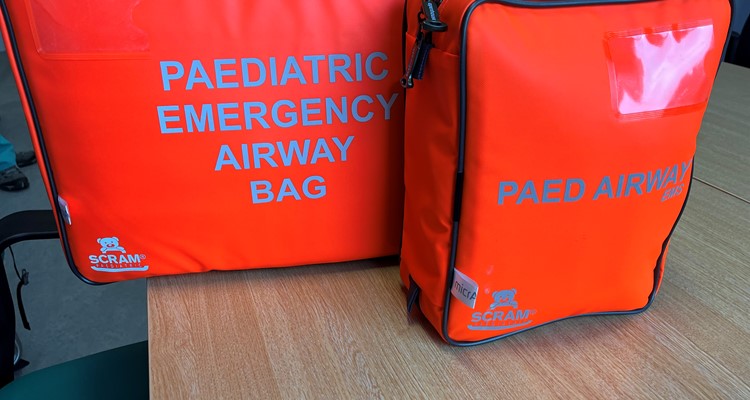
The impact of a new training programme developed and delivered by Dr Dora Paal, Consultant Anaesthetist with NHS Highland, has been lauded as ‘amazing’ in how it has trained up staff in rural hospitals across Highland on how to provide emergency treatment to children.
Dr Paal, who splits her time between Raigmore Hospital and Caithness General, as well as working for the Emergency Medical Retrieval Service (North) based in Aberdeen, has been working on supporting the rural hospitals in their management of paediatric patients. The nature of rural facilities does mean that, while there is support remotely from other centres, there is less likely to be an expert in paediatric care present.
Her work has highlighted the need to standardise and simplify the equipment and review the practise processes used in the resuscitation of children. For this she used an existing paediatric SCRAM (Structured CRitical Airway Management) bag to standardise and structure airway equipment for children of all ages and, along with colleagues, developed various aids such as checklists and action cards, to be included in the bag that help the clinical teams to deliver time critical care to sick children.
Dr Paal and her team, colleagues Dr Jonathan Whiteside, Consultant Intensivist and Unit Clinical Director for the Critical Care Department; Dr Fatima Sheik, a rural GP currently working in emergency medicine in Raigmore; Dr Jake Dowell, a Clinical Development Fellow working in Critical Care; and Dr Douglas Sharpe, a Specialty Doctor in Anaesthetics and ICU; have been using an innovative training approach to demonstrate and practice use of the SCRAM bag.
Traditionally, if you needed to be trained in a skill or scenario that presented infrequently to your healthcare setting, you would regularly need to travel to a facility with higher exposure to such cases. With her experience in Teaching Hospital, District General Hospital and Rural General Hospital practice, Dr Paal realised that how we train staff in rural settings needed to change.
Dr Dora Paal said: “There is educational value in providing training for rural colleagues and their teams in a familiar environment, without the need for them to individually travel to larger centres. Instead of asking them to come to Raigmore we, as a team, travel to our Rural General Hospitals on a regular basis to deliver training, in-situ, to the whole of the team, in their own environment amongst their peers.
“This model reduces the stress associated with simulation-based training, improves staff engagement, increases the relevance of the learning experience and above all helps staff access valuable and necessary exposure to regular training sessions. It has also improved inter-hospital communication, team working, networking and patient safety across NHS Highland sites.
“We have designed an innovative outreach training package that could be applied to any Rural Health Care setting; be that Rural General Hospital (RGH), Community Hospital or Primary Healthcare facility. The model can also be used in larger health care settings. Although the focus is on the sick child presenting to rural settings, the model can easily be adapted to providing training for other emergency scenarios for any age group.”
The training programme includes various emergency-based scenarios such as management of asthma, sepsis, meningitis, trauma, bronchiolitis and pneumonia amongst others. A number of skills-based training stations were also added to train staff in infrequently encountered clinical procedures, such as intraosseous needle insertion, neonatal airway management and newborn life support.
Dr Paal’s colleague, Dr Jonathan Whiteside, has been instrumental in building the paediatric specific elements of these modules, as well as overseeing the contents of the training.
Dr Jonathan Whiteside said: “The impact of the training on our Rural Hospitals has been no less than amazing. The engagement from the RGH teams has led to improved confidence in dealing with emergencies in children. Since implementation, the standardised equipment and cognitive aids have been contributing to improved preparedness to delivering time critical interventions when needed. The rural teams appreciate and value this new and innovative way of teaching. In addition to the above benefits the training model of our small group travelling to the rural sites represents cost saving over the traditional model and helps to engage local teams to train together, in their own environment for the good of their own communities.
“We have timed our training sessions to capture junior doctor rotations in Caithness, Fort William and Skye, but the training is intended and is beneficial to all groups of health care professionals including doctors, nurses, Allied Health Professionals, Healthcare Support Workers, paramedics and colleagues in primary care.
“Over 240 staff have been trained across nine sessions (18 days) this year and feedback has been overwhelmingly positive with comments including ‘we will be wondering how we managed without it’, ‘excellent innovation’, and ‘what’s not to recommend, it’s superb’. Our plan is to continue this training across the north of Scotland.
“None of this would have been possible without the drive, enthusiasm, and commitment to supporting our dedicated rural healthcare teams demonstrated by all members of the team. This valuable, innovative outreach quality improvement project has delivered a sustainable training model for the rural healthcare settings within NHS Highland and is undoubtedly contributing to improved patient care and safety.”
